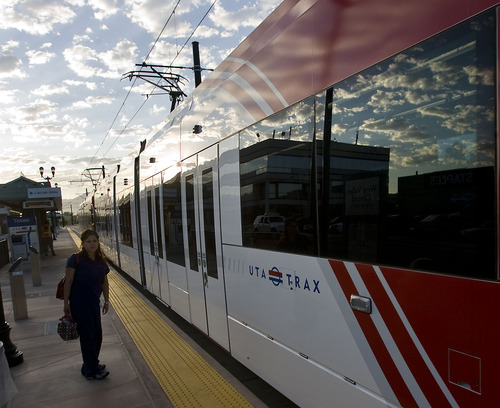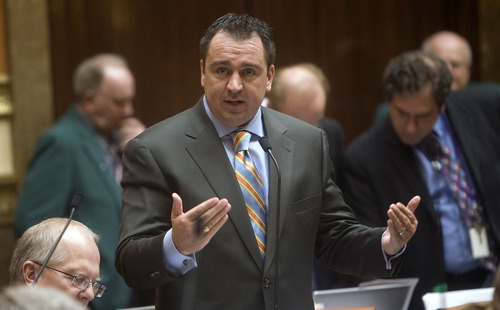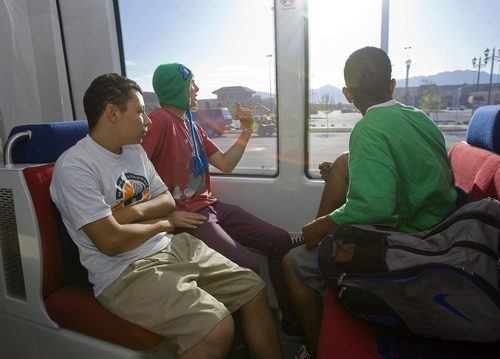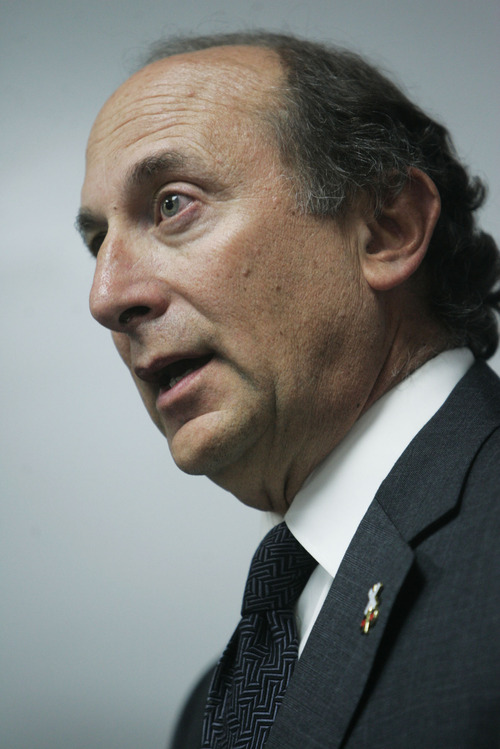This is an archived article that was published on sltrib.com in 2014, and information in the article may be outdated. It is provided only for personal research purposes and may not be reprinted.
The Utah Transit Authority has decided to slash the top bonuses it will give to executives from the current $30,000 each per year to $7,500.
The change comes after a brutal legislative audit last month attacked high bonuses and pay for UTA executives, among other problems. While agency officials testified then that they were changing the system to reduce bonuses, they gave few details.
They still are providing few specifics, and denied a Salt Lake Tribune open-records law request for documents describing the new program, criteria to decide bonuses and overall funding for it. UTA said the new plan and documents remain confidential — "protected" in the language of Utah records law — because they are still in draft form.
"But I have been authorized to inform you that a cap amount of $7,500 has been established, and executives and top performers may receive up to that amount," wrote Michelle V. Larsen, UTA senior records officer.
UTA President and CEO Michael Allegra also declined an interview about the changed program, saying he prefers to wait until it is finalized — and promised to talk about it then.
Fifty-eight UTA executives received bonuses topping $7,500 last year, with Allegra and six other top officials getting some $30,000 apiece.
Last month when the legislative audit was released, UTA officials testified that they have changed their pay system to lower bonuses — but said little beyond that.
UTA Chairman Greg Hughes, who is also a state legislator, testified to the Legislative Audit Subcommittee, "We as a board have recently reduced bonuses." Allegra also testified, "We have changed our compensation policies."
A UTA email to the Tribune at that time also said, in part, "Incentive awards will be significantly reduced for executives and top managers."
UTA's new response to the Tribune records request shows the agency is still working out exactly how the new bonus program will work, beyond a decision to cap bonuses at $7,500. The UTA Board also recently adopted a policy requiring any bonus of more than $8,000 to be approved by the board in an open meeting.
UTA spokesman Remi Barron said the $7,500 limit "is not a soft cap," even though a board vote could allow a higher bonus. He said the board policy on votes for anything over $8,000 was adopted before the new lower limit was settled on by Allegra.
Testimony by Hughes and Allegra and the earlier UTA email gave some hints at what may be measured in awarding incentive pay. They said the focus for UTA has shifted from completing large rail projects to improving operations — and that the bonus system will reflect that changed priority and measure officials' performance accordingly.
UTA's response this week also said that all 748 UTA administrators, not just some, will participate in the new program.
Christopher Stout, cofounder and president of a group that calls itself the Utah Transit Riders Union and closely watches UTA, said it supports bonuses if they truly help motivate officials to improve service. But he questions whether that will really happen.
"I'm still skeptical," he said, saying past goals that UTA officials had to hit to win a bonus were far too easy, and said he expects that to continue.
"Do the math. If there's 748 people who are eligible for up to $7,500 each, that's still more than $5 million in bonuses" that could go instead to service, he said.
"The close to $2 million spent in the last bonus round could have been used to run FrontRunner on Sundays for a year. It also could have been used to provide bus and TRAX service later in the evenings and more often on Saturdays."
"Bonuses shouldn't be there," said Claire Geddes, an activist who is a long-time UTA critic. She said UTA service is too poor to merit it, especially with little service nights and weekends. "In the real world, when you have that kind of record, you don't get a bonus. You usually get fired."
Last year, Allegra had a total compensation package of $402,187, including a $30,000 bonus. In comparison, Utah Gov. Gary Herbert's total 2013 compensation was $151,294, with no bonus included.
UTA General Counsel Bruce Jones also received a $30,000 bonus. Five other UTA executives received bonuses of $29,918 each, and three others received bonuses of more than $20,000.
Another 22 executives received bonuses of between $10,000 and $20,000. And 28 received bonuses between $7,500 and $9,999, records show.
Legislative auditors questioned the large bonuses, and complained UTA did not include them in studies that the agency used for salary market-rate comparisons. The agency has said its executives are paid the same or less than counterparts at transit agencies nationwide.
The audit noted that UTA had claimed Allegra's base salary was 3 percent below market value. "However," auditors said, "in 2013 the general manager also received $173,629 in benefits and bonuses that were not compared to the market."









